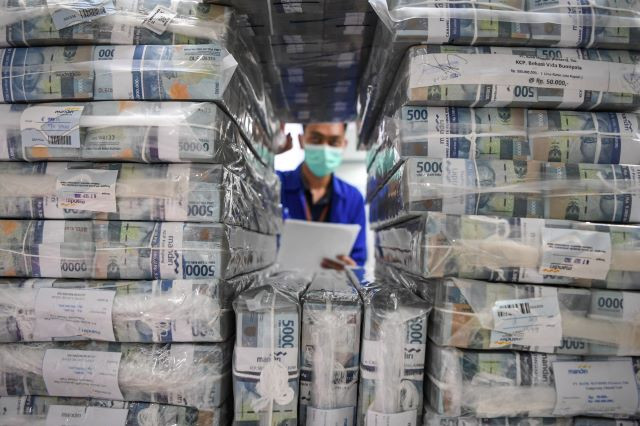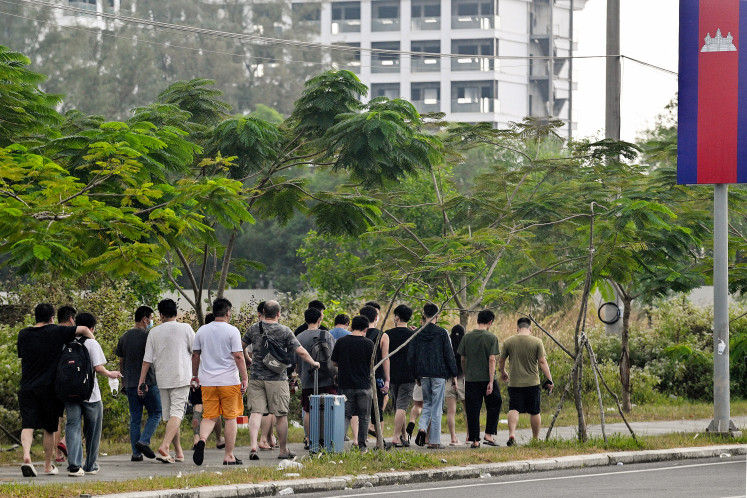Popular Reads
Top Results
Can't find what you're looking for?
View all search resultsPopular Reads
Top Results
Can't find what you're looking for?
View all search resultsStability over growth
As most of President Joko “Jokowi” Widodo’s cabinet ministers will be preoccupied with the political agenda of their respective political parties, the fiscal and monetary authorities will be practically the sole management of the economy.
Change text size
Gift Premium Articles
to Anyone
F
ocusing on stability over growth, as reflected in Bank Indonesia’s (BI) surprise move on 0ct. 19 to raise its benchmark rate by 25 basis points to 6 percent, is the right monetary stance in coping with the persistent global economic uncertainty, geopolitical tensions and the risks of escalating political noise and even political turbulence in the run-up to the Feb.14, 2024 presidential election.
The BI board of governors explained that the tightening policy was a pre-emptive and forward-looking monetary measure to mitigate the multiplier damages of imported inflation after the rupiah has been battered by negative market sentiments since last month and has depreciated by almost 3 percent to around Rp 16,000 per US dollar last week. In fact, a pre-emptive move has been common among many central banks because the macroeconomic costs from doing too little are bigger than doing too much. Controlling inflation is one of BI’s main missions but market trends have shown that exchange-rate stability has often been the main goal because the experiences of other countries have also shown that countries with low headline inflation tend to have stronger currencies.
True rising interest rates pose risks for commercial banks, even though many benefit by collecting higher interest rates from borrowers while keeping deposit rates low. Loan losses may also increase as both consumers and businesses face higher borrowing costs. But we think if the decision to be taken by the US Federal Reserve at its next FOMC meeting (Nov. 2) is a further tightening measure, BI could again raise its rate at its Nov. 23 or Dec. 21 monthly meeting. After all Indonesia’s economy, which is expected to grow only by 5 percent this year, down from 5.3 percent in 2022, is more fiscal driven. Headline inflation has also dropped, to 2.28 percent last month year-on-year.
Encouraging though is that BI will continue to enhance rupiah liquidity so as not to cause a steep drop in credit growth by strengthening its accommodative macroprudential policy stance through the effective implementation of Macroprudential Liquidity Policy Incentives (KLM) and by lowering the Macroprudential Liquidity Buffer (MPLB) to revive lending/financing for national economic growth. Payment-system digitalization has also been accelerated to expand digital economic and financial inclusion, including the electronification of central and regional government transactions.
BI also continues to strengthen its monetary operations strategy for effective monetary policy by optimizing Bank Indonesia Rupiah Securities (SRBI) as a pro-market monetary instrument and by issuing Bank Indonesia Foreign Currency Securities (SVBI) and Bank Indonesia Foreign Currency Sukuk (SUVBI) starting on Nov. 21 for money-market deepening. This is important because the instruments can act as a proxy for short-term interest rates in Indonesia and thus signal the expected direction of monetary policy.
In view of the escalating political noise and the risk of political turbulence in the next few months policy coordination between BI and the government is even more imperative to maintain macroeconomic stability and safeguard economic growth from the spillover effect of high global uncertainty. As most of President Joko “Jokowi” Widodo’s cabinet ministers will be preoccupied with the political agenda of their respective political parties, the fiscal and monetary authorities will be practically the sole management of the economy.
Hence policy synergy between BI and the Financial System Stability Committee, whose members comprise the central bank governor, the finance minister and the chiefs of the deposit guarantee corporation and the Financial Services Authority, will become even more vital in maintaining macroeconomic and financial sector stability, while nurturing financing to businesses, particularly in priority sectors.
So far, we should commend BI for its consistency in improving its information flow, disclosures and transparency as regards its policy making because this stance is the first line of defense to protect the rupiah from being bashed by wild rumors and waves of disinformation, which would likely mount up amid the political campaigning between December and early February.











